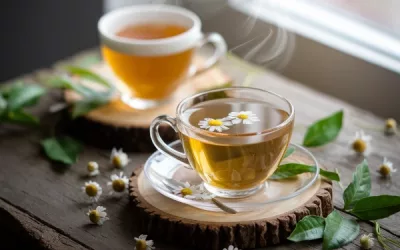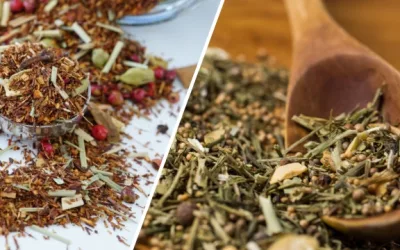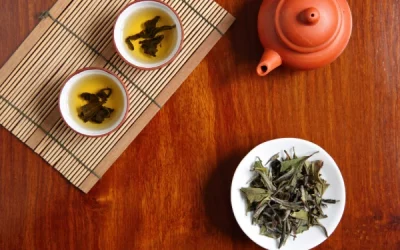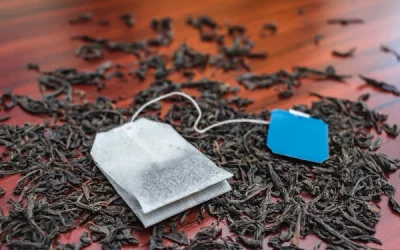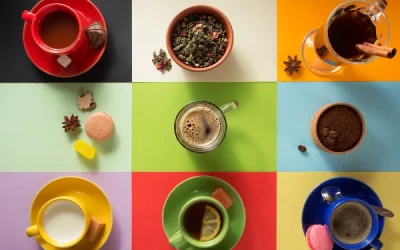Did you know that around 2 billion people sip tea daily, making it the second most consumed beverage in the world after water? It’s no wonder that the debate around black tea and green tea continues to brew among health-conscious drinkers. Both teas offer unique health benefits, but understanding their differences is key to making informed dietary choices. This article dives deep into the health implications of each tea, exploring their antioxidants, weight management properties, and cognitive effects, ultimately helping you decide which may be better for your needs.
Table of Content
- What are the key differences between black tea and green tea?
- How do taste preferences influence tea choice?
- What are the taste characteristics of black tea versus green tea?
- How does brewing time affect the flavour of each tea?
- Can both teas be consumed together for health benefits?
- Is there a benefit to alternating between black tea and green tea?
- How can one incorporate both types of tea into their daily routine?
- Are there any risks associated with drinking both teas?
- What is the conclusion on black tea versus green tea?
- Conclusion
What are the key differences between black tea and green tea?
Black tea and green tea are popular beverages enjoyed by tea enthusiasts globally. While they come from the same plant, Camellia sinensis, their differences arise from their processing methods, antioxidant properties, caffeine levels, and flavour profiles. Let’s dive into their distinctions.
Green tea undergoes minimal oxidation during processing. The leaves are often steamed or pan-fried soon after picking to prevent oxidation. This method helps retain its green colour and delicate flavour. Conversely, black tea undergoes full oxidation, giving it a darker colour and a richer, more robust flavour.
In terms of antioxidants, green tea is renowned for its high catechin content, especially epigallocatechin gallate (EGCG). These antioxidants have been linked to numerous health benefits, including improved cardiovascular health and weight management. Black tea contains theaflavins and thearubigins, which also offer unique health benefits.
Now, let’s explore these differences in more detail.
What is the main difference in the processing of black tea and green tea?
Green tea and black tea start from the same leaves but their processing diverges significantly. The primary variation lies in their oxidation process.
- Green Tea Processing:
- Leaves are quickly steamed or pan-fried to prevent oxidation.
- Retains green colour and fresh, grassy flavour.
- Minimal oxidation.
- Black Tea Processing:
- Leaves are fully oxidised.
- Develop deeper flavours and darker colour.
- Undergoes a process involving withering, rolling, and fermenting before drying.
These methods of processing contribute to the distinct characteristics of each tea. Green tea tends to have a lighter, more vegetal taste while black tea offers a more robust, malty flavour.
What are the implications of caffeine content on health?
Caffeine levels in tea can impact your health in various ways. Understanding the caffeine content in black tea and green tea can help you choose which one suits your needs best.
- Caffeine in Green Tea:
- Contains less caffeine than black tea.
- Offers a milder energy boost without the jitters.
- Ideal for those sensitive to caffeine.
- Caffeine in Black Tea:
- Higher caffeine content compared to green tea.
- Provides a stronger energy boost.
- Can improve alertness and concentration.
While caffeine can enhance alertness and physical performance, excessive consumption might lead to jitteriness or sleep disturbances. Choosing the right tea depends on your caffeine tolerance and health goals.
In the 8th century, a Buddhist monk named Saicho brought tea seeds from China to Japan, which marked the beginning of Japan’s tea culture. He initially planted the seeds in the Kyoto region, laying the foundation for what would become Japan’s revered tea tradition.
The cultivation of green tea spread, and the meticulous art of tea ceremony was born. This historical exchange highlights the cultural significance and evolving appreciation of tea across different societies.

How do taste preferences influence tea choice?
Deciding between black tea and green tea can be an uphill battle if you’re a tea lover. It’s like choosing between pizza and burgers—both are delicious but bring entirely different experiences to the table. Here’s a dive into how your taste preferences can swing your choice one way or the other.
Flavour profiles are key to this discussion. Black tea tends to have a bold, robust flavour, sometimes reminiscent of malt, caramel, or even a whiff of smoky bacon. Green tea, on the other hand, is lighter and grassier, often with vegetal flavours that remind one of fresh-cut grass or steamed spinach. Do you like your mornings to start with a punch-in-the-face taste or a more subtle, gentle nudge? That will guide you.
Brewing methods also play a part. Black tea begs for boiling water, whereas green tea prefers a gentler touch. Get too enthusiastic with the temperature, and green tea will scold you with bitterness. Black tea isn’t as touchy—it’s more forgiving like that.
Let’s not forget cultural influences. Maybe you’re into Japanese cuisine and appreciate a traditional matcha ceremony. Or perhaps a classic British afternoon tea with scones sounds more up your alley. Cultural context significantly impacts what you might gravitate towards.
Lastly, individual health goals shouldn’t be ignored. Are you looking for a caffeine jolt? Black tea’s got your back. Trying to eke out more antioxidants to combat those pesky free radicals? Green tea for the win.
What are the taste characteristics of black tea versus green tea?
Black tea and green tea engage your taste buds in dramatically different ways. Here’s the lowdown:
- Black Tea:
- Bold and robust flavour
- Often malty, caramel-like, or smoky
- Can have fruity or spicy undertones
- Typically stronger in taste
- Green Tea:
- Light and grassy
- Vegetal notes like fresh-cut grass or steamed spinach
- Can be sweet, nutty, or even a bit seaweedy
- Generally milder and more subtle
So, if you’re the kind of person who needs a wake-up slap from your morning brew, black tea is for you. But if you prefer a gentle awakening, green tea might be your best mate.
How does brewing time affect the flavour of each tea?
The clock is a tyrant when it comes to brewing tea, but it’s a tyrant you’ll want to cozy up to. Both teas react differently to brewing time:
- Black Tea:
- Ideal brewing time: 3-5 minutes
- Over Brew: Gets bitter and astringent
- Under Brew: Weak and flavourless
- Green Tea:
- Ideal brewing time: 1-3 minutes
- Over Brew: Turns bitter quickly
- Under Brew: Too light and might miss the flavour mark
- General Tips:
- Use a timer to get it right
- Experiment with steeping to find your sweet spot
- Different types of tea leaves can require varying times
Fiddle with the brewing duration, and you’ll find the balance. Too long, and you’ll be drinking something akin to caffeinated battery acid. Too short, and it’ll be like sipping on coloured water.
Can both teas be consumed together for health benefits?
So, you’re wondering if you can double-dip into the tea world and slurp up both black and green tea? The short answer is: absolutely. Now, let’s dig a bit deeper into the leafy goodness and find out if this tag-team effort can do wonders for your health.
Both black and green tea come with their own set of health perks. Combining them is like having a superhero duo in your kitchen. Green tea is known for its antioxidant properties and some studies suggest it boosts metabolism. Black tea, on the other hand, is great for heart health and its robust flavour can give you that caffeine kick when your eyelids are losing the battle with gravity.
Though drinking both teas can offer a well-rounded, diverse array of benefits, it’s essential to look at a few factors. You want to enjoy the variety they bring to your diet while also being cautious about potential risks, and of course, tailoring it to your personal preferences. Let’s break it down for you.
Is there a benefit to alternating between black tea and green tea?
Short answer: Yes! Alternating between black and green tea can be like having the best of both worlds.
- Antioxidants Variety: Green tea is rich in catechins, while black tea has theaflavins. Both are antioxidants but work differently. It’s like having both Batman and Superman on your team.
- Balanced Caffeine Intake: Green tea has less caffeine compared to black tea. So, if you alternate, you’ll avoid too much caffeine but still get that boost when you need it.
- Taste Variety: Because let’s face it, drinking the same thing every day can get dull. Black tea’s robust taste and green tea’s lighter flavour offer a good balance.
- Mental Health: Different types of teas have unique benefits like black tea’s L-theanine which helps in concentration and green tea’s positive effects on anxiety.
Switching between these two can provide a multifaceted approach to health, keeping your routines interesting and beneficial.
How can one incorporate both types of tea into their daily routine?
Ah, the million-dollar question! How to infuse (pun intended) both kinds into your day-to-day life without burning out your tastebuds?
- Morning Routine: Start your day with a cup of black tea. It’s like a soft punch to kickstart your day. The caffeine will help you wake up, and its rich flavour can be a perfect breakfast companion.
- Midday Sip: Around lunch or early afternoon, switch to green tea. It’s light and won’t interfere much with digestion. Plus, the antioxidants can help combat any sluggishness.
- Evening Wind Down: An hour or so before bed, green tea could be your go-to. Opt for a decaf version if you’re sensitive to caffeine. This can help in winding down without the jitters.
- Weekend Treat: Try blending the two for a unique taste experience. Some people even mix them in a single tea concoction to get the best of both worlds simultaneously.
This approach ensures you’re not overwhelming your system while reaping the benefits of both teas.
Are there any risks associated with drinking both teas?
While mixing and matching your teas sounds divine, let’s not forget the potential pitfalls.
- Caffeine Overload: Both teas contain caffeine, albeit in different amounts. Drinking too much can lead to jitteriness, insomnia, and even heart palpitations.
- Tannins Alert: Both teas have tannins, which in excess, can interfere with iron absorption. No one wants an iron deficiency party.
- Digestive Issues: Overdoing it with either tea can lead to upset stomachs. Green tea especially can be harsh on an empty stomach.
- Allergic Reactions: Some people might be allergic to compounds in tea. It’s rare, but it’s a possibility.
Balance is crucial. Moderation will help you avoid any adverse effects while enjoying the lush benefits each tea offers.
In the 18th century, British Prime Minister Charles Grey popularised black tea by blending it with bergamot oil, creating what we now know as Earl Grey. Meanwhile, green tea has been a staple in Chinese culture for thousands of years, dating back to the legendary Emperor Shen Nong.
Both historical figures knew their stuff when it came to enjoying a good brew. So, take a leaf out of their book and savour the flavours while respecting the balance.
What is the conclusion on black tea versus green tea?
You’re standing in the tea aisle, faced with a monumental decision: black tea or green tea? The ticker goes off in your brain—delicious dilemma alert! Let’s unravel the intricacies of this epic face-off.
First things first, both black and green tea come from the same plant, Camellia sinensis. What separates these tea cousins are the processing methods. Black tea is fermented; green tea is not. This simple difference leads to diverse flavours, colours, and health benefits.
Overall health benefits
Black tea brings a bold taste, higher caffeine, and a rich array of antioxidants known as theaflavins. They help decrease bad cholesterol and improve heart function. Meanwhile, green tea is a humble superhero, packed with catechins known for their weight loss and anti-cancer properties. Did we mention the jolt of brain-boosting focus? Let’s break it down:
- Cardiovascular Health: Black tea generally wins, thanks to the theaflavins.
- Weight Loss: Green tea steals the limelight with its metabolism-boosting catechins.
- Caffeine Content: Black tea provides a higher dose, perfect for kick-starting the day.
- Antioxidants: Both teas are rich in these health fighters, but green tea edges ahead with its unique catechins.
- Brain Health: Both varieties offer neuroprotective benefits.
Shall we move on to something equally fascinating?
Individual preferences
When it comes to tea, it’s a personal affair. You like what you like, end of story. But figuring out your preferred brew involves a little experimentation.
First, consider your caffeine tolerance:
- High-energy mornings? Black tea it is.
- Need just a light boost? Green tea to the rescue.
Next, there’s flavour:
- Black tea: strong, rich, and robust.
- Green tea: mild, slightly grassy, and delicate.
Time of day is another factor:
- Morning rush? Black tea’s your ally.
- Afternoon unwind? Reach for green tea.
Choosing between them is like choosing your favourite band; sometimes, you don’t know until you try a few gigs.
Where does this leave you in making an informed choice?
Recommendations
Picking between these two wonders doesn’t have to be a Herculean task.
- For Specific Health Goals:
- Heart Health: Opt for black tea.
- Weight Loss: Green tea is your buddy.
- Calm Focus: Green tea’s light caffeine hits the spot.
- Bold Energy: Black tea’s higher caffeine wins.
- Lifestyle Considerations:
- Need a morning wake-up call? Black it is.
- Want a mellow afternoon sip? Green’s your choice.
Let’s not forget: mix it up! Variety is the spice of life (and tea shelves).
Informed choice
Navigating the crowded world of tea can be tricky, but with a few pointers, you’re practically a connoisseur.
Just remember:
- Listen to your body.
- Experiment with both.
- Keep an eye on your specific health needs.
- Mix and match for variety.
Consider this: in 2737 BCE, Emperor Shen Nong of China was boiling water when some leaves blew into his pot. Voila! Tea was discovered. Whether you pick black or green, remember, you’re part of a long, delightful history of exploring this age-old brew.
So, grab that kettle, choose your leaves, and get brewing!
Conclusion
As I reflect on the intricate world of black tea and green tea, it’s clear that both beverages hold unique benefits that cater to varied health goals and personal preferences. Throughout this article, we have explored their fundamental differences, from processing methods and antioxidant levels to caffeine content and taste profiles.
By considering these factors, I’ve come to appreciate how each tea offers distinct advantages: black tea shines in supporting cardiovascular health and cognitive performance, while green tea is often associated with weight management and gut health.
Understanding the implications of these findings is crucial. For health-conscious individuals, the choice between black and green tea isn’t merely about preference; it can influence one’s overall wellness journey.
Caffeine, for instance, affects not only energy levels but also appetite and metabolism—a vital consideration for those seeking to manage their weight. Moreover, the cognitive benefits tied to both teas reveal the potential for enhanced mental clarity and focus, emphasizing the importance of moderation to avoid side effects.
Looking forward, individuals should consider integrating both teas into their daily routines, potentially alternating between them to reap the complementary benefits. For someone like myself, experimenting with different brewing techniques and flavours can be a delightful way to refine my routine while focusing on my health objectives.
In closing, the question “Is black tea better than green tea?” doesn’t lend itself to a simple answer. It ultimately lies in the individual’s lifestyle, preferences, and specific health goals.
As I sip my next cup, I’ll ponder this: Can the simple act of choosing a beverage provide insight into our values regarding health and wellness? Perhaps, in the end, the best choice is one that brings not just health benefits, but also joy and a moment of mindfulness to our day.
Resources
- Green tea and cancer and cardiometabolic diseases: a review of the …
- Effects of l-Theanine on Cognitive Function in Middle-Aged and Older Subjects: A Randomized Placebo-Controlled Study
- Mechanisms of Body Weight Reduction by Black Tea Polyphenols
- The Effect of Green Tea Extract on Fat Oxidation at Rest and during …
- Antioxidant Activity of Black Tea vs. Green Tea
- Tea in cardiovascular health and disease: a critical appraisal of the …


